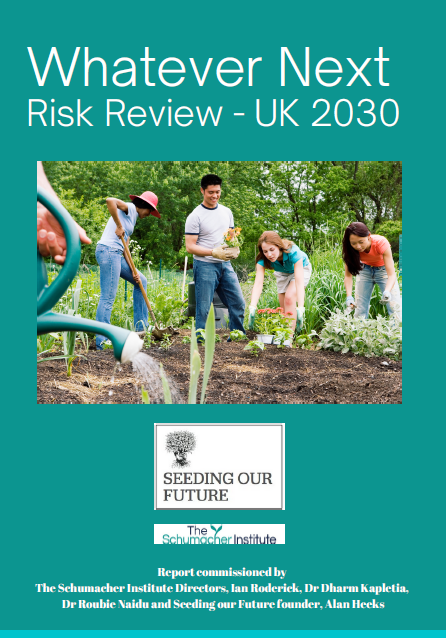Embracing the future – plenty we can do! Insights from new Future Risks report
Insights from new Future Risks report
It’s hard to make sense of the future outlook: there are so many issues, risks and trends which could worry us, at every scale from local to global. And we have to discern real news from fake news, objective facts from mountains of self-interested spin. So I’m pleased to announce the publication of a research report which I commissioned to provide some clarity.
 Whatever Next: Risk Review – UK 2030 has been produced by researchers from the Bristol environmental think tank, Schumacher Institute. It provides an overview of reliable forecasts on issues likely to affect the UK in the next 7-10 years, focussing on the eight risks we judged most serious: see more below. For each issue, best case, likely and worst case impacts are considered, along with options to reduce these impacts.
Whatever Next: Risk Review – UK 2030 has been produced by researchers from the Bristol environmental think tank, Schumacher Institute. It provides an overview of reliable forecasts on issues likely to affect the UK in the next 7-10 years, focussing on the eight risks we judged most serious: see more below. For each issue, best case, likely and worst case impacts are considered, along with options to reduce these impacts.
The report is intended to help community leaders and groups, activists and policymakers. Although many of these risks need a response from UK Government, we highlight adaptation and mitigation steps which local communities can take, recognising that national action on the scale needed is unlikely. The whole report is a readable 45 pages: the revised version is just issued, and gives links to a range of organisations and resources who can help local communities, businesses and NGOs explore practical adaptation measures. You can download it here.
The eight risks featured in the report are:
- Extreme Weather
- Energy
- Water
- Food Supply Constraints
- Pollution – Air, Water, Land and Oceans
- Health and Well-being Impacts – Physical and Mental Diseases
- Social and Cultural Disorder
- Information System Failure
Probably most of these are risks you’re aware of, but the current forecasts of impact can help us to understand how they may play out. In several cases, such as energy and water supply, there is substantial risk that capacity is inadequate, and that contingency plans can’t cope. Information systems failure is a risk which is widely underrated, but whose impacts could be devastating. The UK National Cyber Security Centre see numerous potential sources of cyber attacks, and this report believes major system failures (e.g. banking, NHS, utilities) are likely in the next few years.
This might sound a bit overwhelming, but the report is readable, concise, and focussed on the positive actions local groups can take. Such groups will need to decide how many of these risks they can engage with: the report is intended to help with choices on priorities. As you might suspect, many of these risks are connected, hence awareness of all of them helps in addressing any one of them. You can also find plenty of resources for building community at my website, www.seedingourfuture.org.uk/adaptive-communities.
To give you an idea of the kind of practical, local responses the report suggests, here are its options for Risk 8, Information Systems Failure:
- Avoiding digital interfaces and network-controlled devices and equipment that do not have manual override functionality or easy repairability.
- Maintain duplicate hand-written or printed backups of important information.
- Set-up, invest-in or subscribe to local community energy resilience initiatives, or appropriate retrofit/renewable energy modifications to your home/business.
- Maintaining analogue phone systems for emergencies and other non-digital or traditional methods for ensuring emergency lighting, heat and cooking.
- Join or form a local makerspace lab, or other such open workshop network, creating greater local resilience to manufacture, repair, reuse and recycle.
- Lobby and support local training and education providers to provide curricula aimed at resilient [intermediate], appropriate [low] technology engineering skills.
- Support and lobby local politicians and legal bodies to contest policies and strategies that have not fully considered the range of risks associated with digital transformation on essential services over the next 10 years.
The links to resources for Risk 8 include:
- Websites with how-to guides for low-tech systems.
- An online list of open-source systems and hardware, to reduce dependency on big commercial providers.
- A link to the National Cyber Security Centre (NCSC), so you can report a cyber incident.
- A guide from NCSC to help small non-profit organisations improve their cyber security cheaply and easily.
For each risk, the report provides live web links to a range of websites which can provide more briefing on responses and risks. Alan Heeks of Seeding our Future, who commissioned this research, comments: “for many of the risks we face, local community action has the best chance of increasing capacity, and I hope that Whatever Next helps with both guidance and motivation for those responses”.
